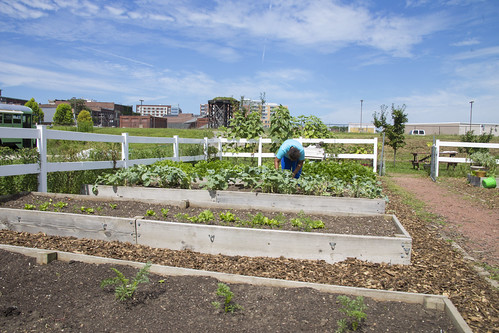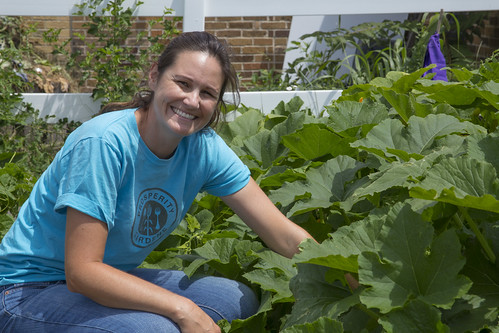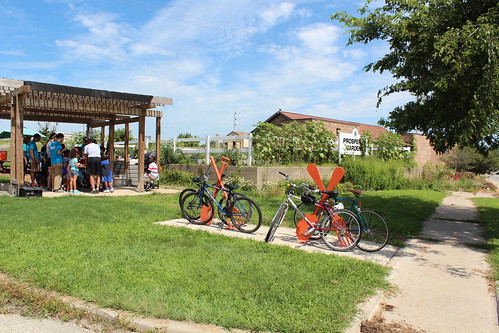
On a small parcel of land in the heart of the City of Champaign, Illinois, are two gardens that offer opportunities for neighbors and the community to learn about growing food, eating nutritious food and earning a living. The Prosperity Gardens are educational, bringing at-risk students to work the ground, grow the plants and sell the produce at local farmer’s markets.
USDA’s Natural Resources Conservation Service (NRCS) was able to help support this important endeavor through The People’s Garden, USDA’s collaborative community garden initiative with more than 1,300 local and national organizations all working together to establish community and school gardens across the country.
Nicole Bridges, University of Illinois Extension Service employee and local Garden Programmer, oversees the activities at the Prosperity Gardens and has been instrumental in gaining neighbor and community support. Bridges did a lot of research when she first started with the garden. She attended local meetings to become familiar with the people who live there and listened when they said, “Our youth need jobs.”

Working with a friend from the Ready School, a school for at-risk high school students, a plan was created to get students to the garden as a class project and then, “The project just exploded,” said Bridges.
Josephine Tritsch, Instructor and Program Coordinator at Ready School, teaches agricultural classes and is expanding the curriculum to include business classes.
“I am teaching agribusiness this fall, which includes selling vegetables to staff and harvesting for the cafeteria in our nascent Farm2School program,” Tritsch explained.
“Class content includes marketing, grain and vegetable production, national and international ag practices, and so forth, through guided team projects and the use of Google apps.” Next spring, Tritsch plans to teach a horticulture class and will co-teach classes in job skills and nutrition.
The students worked in the garden and sold their produce at markets during the summer and early fall. Tritsch said, “The community seemed to enjoy buying from us at both the downtown Champaign market and through our Mobile Market program.”
The Prosperity Gardens staff is also starting a Community Supported Agriculture (CSA) option to be managed by students. In addition to the garden contributing agricultural education and business aspects year-round, during the summer the garden serves as a job site.
With the help of Master Gardeners and volunteers, the Prosperity Gardens hosted children from the Boys and Girls Club, who call their group the “Garden Club,” for nine weeks in the summer. Each student, ranging from six-to-eight years old, had their own plot about two-foot square. They planted a bean and watched it grow.
“Each student takes ownership of their plot to understand what is happening during the growing season,” said Bridges. “They learn about bugs, both good and bad.” They also learn about different types of soil and other science facts.
The beds were color coordinated and contained “garden maps,” that helped students understand what plants look like from garden to plate. There was a sensory garden full of herbs to stimulate more of their senses and they learned about nutrition.
“We have kid-friendly knives and they learn how to peel carrots and chop celery, peppers and herbs,” said Bridges. “So each week, they learn to pick, wash and prepare their snack, like toasted wheat bagels and they made the veggie cream cheese.” Some children have been coming for three years and now mentor the younger ones.
Bridges’ goal for these neighborhood gardens is to close the gap between the older generation and younger generation. “The garden club does just that – it gets these kids at a young age and reintroduces a traditional way of life.”
The rest of the planting beds, including a lot across the street, are for the students to grow, harvest and sell a wide variety of produce that neighbors could enjoy. “They grew produce that is culturally relevant with the neighborhood taste, such as collards, green beans, okra, jalapeno peppers, and other items that people in the community enjoy,” said Bridges.
The Prosperity Gardens are a non-profit and they have received donations and grants from local businesses, hospitals, a church and the University of Illinois Extension Service.
“With NRCS’ contributions we purchased items we’ve needed for some time,” said Bridges. They were able to purchase produce crates for harvesting, storing and use at the market. “They sanitize well, collapse for storage, and have made us more productive where we meet agriculture food safety requirements to attend the farmers markets,” she adds.
They currently lease the two garden lots from the city. A new grant will help build a wash and pack facility and they are searching for another acre of city land to house that facility and potentially install high tunnels to extend the growing season. Bridge’s goal is to establish the city’s first commercial urban farm.
Currently the gardens are split between education, nutrition, and marketing the produce. Once the farm and facility is built and functioning, the current gardens will be dedicated to education.
The future hope for Prosperity Gardens is to expand the Farm2School Program and include other youth organizations. “The Boys and Girls Club would like to expand their program beyond the six-to-eight-year-olds as well, making it a great place to learn and have fun,” said Bridges.




